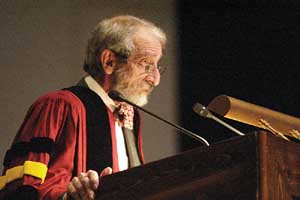New faculty cast will argue long-lived debate
By Seth SandersNews Office
 Ted Cohen, Professor in Philosophy and the College, moderates last year’s Latke Hamentash Debate and will do so again this year. The event will take place from 7:30 to 9:30 p.m. in Mandel Hall Tuesday, Nov. 25. |
The beloved Annual Latke Hamentash Debate will take place on the Tuesday before Thanksgiving, just as it has for more than 50 years. This year’s debate will be from 7:30 to 9:30 p.m. Tuesday, Nov. 25, in Mandel Hall, 1131 E. 57th St., and welcomes back Ted Cohen, Professor in Philosophy and the College, as moderator.
But this year boasts an entirely new and potentially funny cast of participants including Donald Levine, the Peter B. Ritzma Professor in Sociology and the College (hamentashen); Albert Madansky, the H.G.B. Alexander Professor Emeritus of Business Administration in the Graduate School of Business (latkes); Anne Walters Robertson, Deputy Provost for Research and Education and the Claire Dux Swift Professor in Music and the College (undecided); and Mindy Schwartz, Associate Professor in Medicine (“objective”).
The Chicago Rhythm and Jews, an a cappella group, will open the festivities, and Karl Fogel will serve once again, as he has before, as pianist.
Ted Cohen, longtime moderator of the event, was asked to reflect on the deeper significance of the debate. “People keep asking me when it is,” he responded, “and it’s always the Tuesday before Thanksgiving.” When forced to reflect further, he mused: “It very often happens that the participants simply subvert the whole thing. They don’t take any side at all or they tell us the whole thing is a mistake, that a thing like kreplach is better than either. This kind of bad behavior is common. There will be a vote taken among the audience members to decide which food won, but the panelists will not decide. Of course they may have been persuaded by the panel.”
On the debate’s history, he said, “This is the 57th, 58th or 59th, depending on how you count. A couple of times we went and staged it in New York, as a rather less-extravagant operation. We did it there first with Hillel Rabbi Danny Leifer, and we’ve done it once since David Rosenberg took over. As I always point out, this makes it a little hard to count. Annually speaking, it is the 57th.”
Cohen said the event began with a very small audience in the living room of the Newberger Hillel Center and then moved to a room on the first floor of Ida Noyes Hall, then to Max Palevsky Cinema, then to Mandel Hall to accommodate an ever-growing audience. The debate draws several hundred people each year.
“Mandel also works well since we jazzed the thing up with a processional and a recessional, which adds to the overall comic effect and ludicrousness,” added Cohen.
Cohen explained how the participants are selected: “I get consulted regularly by the Rabbi. One of the constraints is that, ever since Leifer decided on this, we’ve wanted to have at least one Jew. Occasionally Leifer would make a mistake and we would have two.
“Ultimately you’re trying to make a prediction about who would be funny. I have been wrong as often as I have been right; usually I have been wrong in predicting that someone would not be funny, and they have turned out to be funnier than I could have imagined.”
Cohen noted that this year’s presentation will have more audio-visuals, including a PowerPoint presentation, CDs, a slide projector, a computer and a blackboard. “It is worth noting that I think it’s not hyperbole or a joke to say that some of the participants prepare their talks with more care and trepidation than any of the regular lectures they give. Biologist Jim Shapiro’s heavily illustrated lecture on the mating habits of the hamentashen comes to mind.”
And what works? “The audience likes many things, but it is predisposed to like Yiddish words and off-color humor. We try to rise to the highest level of humor, but there’s a lot to get your teeth into if you’re a Benny Hill fan.”
Spectators are encouraged to show support for their preferred victual by coming to Mandel Hall dressed in a latke- or hamentash-related costume. Sponsored by the Newberger Hillel Center, the debate will be followed by a reception at which latkes and hamentashen will be served. The fee for the reception is $3 in advance or $4 at the door.
Registration for the reception can be completed by visiting the Web site at http://hillel.uchicago.edu or calling the Newberger Hillel Center at (773) 752-1127.
The Jewish Graduate Student Association encourages audience members to bring a clothing or non-perishable food item(s) to the event to be donated to the Ark, Deborah’s Place, and the Living Room Café & the Caring Closet.
![[Chronicle]](/images/sidebar_header_oct06.gif)